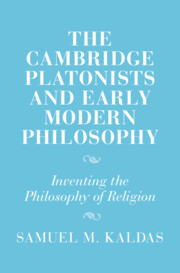Book contents
- The Cambridge Platonists and Early Modern Philosophy
- Cambridge Studies in Religion and Platonism
- The Cambridge Platonists and Early Modern Philosophy
- Copyright page
- Dedication
- Contents
- Acknowledgements
- Note on the Text
- Abbreviations
- Introduction: The Cambridge Platonists and Philosophy of Religion
- Part I The Origins of Cambridge Platonism
- Part II Rival Conceptions of God and Goodness:
- 5 Goodness and the Will of God:
- 6 Is God an Arbitrary Tyrant?
- 7 Righteousness Real and Imagined:
- Part III The Religious Epistemology of the Cambridge Platonists
- Conclusion: The Cambridge Platonists as Early Modern Christian Platonists
- References
- Index
5 - Goodness and the Will of God:
Moral Realism versus Voluntarism
from Part II - Rival Conceptions of God and Goodness:
Published online by Cambridge University Press: 09 May 2024
- The Cambridge Platonists and Early Modern Philosophy
- Cambridge Studies in Religion and Platonism
- The Cambridge Platonists and Early Modern Philosophy
- Copyright page
- Dedication
- Contents
- Acknowledgements
- Note on the Text
- Abbreviations
- Introduction: The Cambridge Platonists and Philosophy of Religion
- Part I The Origins of Cambridge Platonism
- Part II Rival Conceptions of God and Goodness:
- 5 Goodness and the Will of God:
- 6 Is God an Arbitrary Tyrant?
- 7 Righteousness Real and Imagined:
- Part III The Religious Epistemology of the Cambridge Platonists
- Conclusion: The Cambridge Platonists as Early Modern Christian Platonists
- References
- Index
Summary
The Reformed theology that dominated Cambridge in the mid seventeenth century tended strongly towards a voluntarist conception of God’s relation to morality, on which God’s will is the sole determiner of moral truths. This chapter demonstrates that over the same short period (c. 1642–51), the Cambridge Platonists all took a controversial stand against the voluntarism of their Calvinist colleagues, arguing for a kind of moral realism on which God’s goodness precedes, and in a sense even constrains his will. They did this despite the fact that their realist position was routinely denied and condemned in Reformed preaching about predestination. Whichcote, More, Cudworth and Smith’s arguments against voluntarism and in favour of realism in this narrow time period suggest close intellectual contact while also matching Tuckney’s description of the doctrinal profile of Whichcote’s ‘learned and ingenious’ Plato-loving scholars.
Keywords
- Type
- Chapter
- Information
- The Cambridge Platonists and Early Modern PhilosophyInventing the Philosophy of Religion, pp. 111 - 140Publisher: Cambridge University PressPrint publication year: 2024

